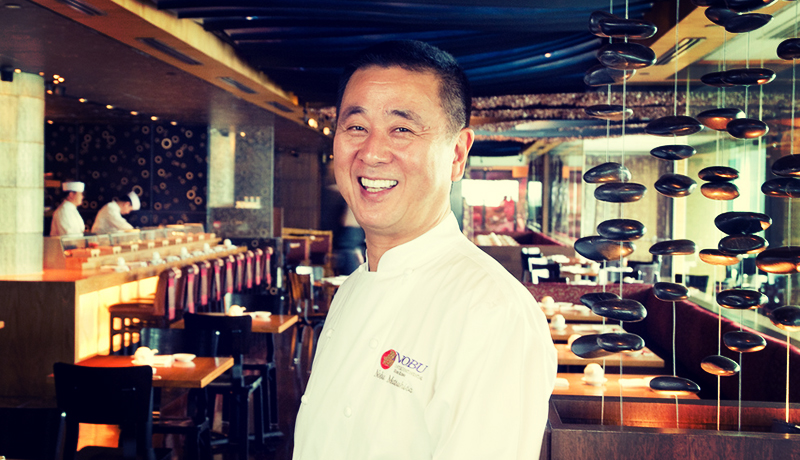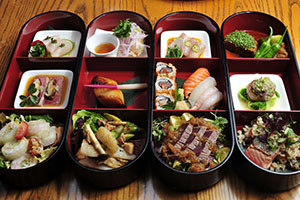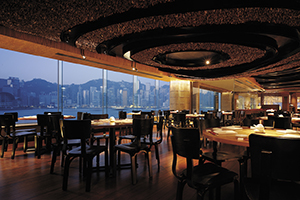

Chef Nobuyuki Matsuhisa
Photo Courtesy of InterContinental Hotel Group
Acclaimed chef Nobuyuki Matsuhisa, best known as simply Nobu, has lived a storied career, having worked everywhere from Argentina to Alaska. After a devastating fire destroyed his Anchorage restaurant in 1977, though, Nobu suffered financial and emotional ruin.
His luck changed after opening Matsuhisa in Beverly Hills, which became a hot spot among Hollywood stars. Robert De Niro paid a visit to the restaurant, fell in love with Nobu’s Peruvian-Japanese dishes and eventually persuaded the chef to join him as a partner and open Nobu in New York City in the mid-’90s.
Since then, the Saitama, Japan, native has sat atop the culinary world. In between making sure that the 30-plus restaurants bearing his name (and his burgeoning hotel empire) were running smoothly, Nobu found time to talk about his career’s turbulent start, his cooking philosophy and the recipe to his success.
You brother introduced you to your first sushi experience. What do you remember about that day?
Being a sushi chef was my dream since the first time I stepped into a sushi restaurant. I was like 10 or 11 years old. That day, I just felt like, “Wow.” It was this energy when I arrived in the restaurant. I loved how you could smell the vinegar, the rice and how you could see all the different fresh fish on the counter.
I didn’t know anything about sushi. The chef was so kind and talked to me about all the different fish, and what I was about to eat. And after that first bite, it was just settled.
For my generation, sushi was a very high-end food. You couldn’t just eat it whenever you wanted or find it in 7-Eleven like you do now. It was like something you ate once or twice a year when a special guest came to your home.
Did you go through a traditional Japanese training experience?
For the first three years [at Matsue Sushi in Tokyo], I was a dishwasher, a busboy and learned how to clean the fish. But I never set foot near the sushi bar.
I had no apartment. I stayed with the chef’s family. We went to the fish market every morning and he showed me how to pick the fish, how to negotiate, and I’d carry the basket back to the restaurant.
I only had two days off a month and a very low salary. But for my generation, it wasn’t about working to make money. It was about learning — how to pick the fish, how to clean ingredients properly, mastering the techniques.
But now the generation asks first, “Okay, how much will you pay me?” It’s a different style. Anything my mentor said, I responded, “Yes, sir.” Even though it was hard work, I never gave up, because being a sushi chef was my dream.
When did you finally get to learn to make sushi?
After three years, the elder chef graduated and opened his own restaurant. So my mentor started teaching me how to make sushi. But still, I wasn’t allowed to touch the rice. I used a small towel to mimic the movements. I would copy my mentor’s hands from the side and train at the end of the day, rolling, rolling [the towel], but with no rice.
The first sushi I ever made was a cucumber roll. One day, my mentor said, “Show me your cucumber roll.” It was a test. But I passed and he let me start making sushi.
What are some lessons you learned from your mentor that have stuck with you through the years?
My mentor was always teaching me and always taking time to show me the techniques. One time, I was sharpening my knife while watching TV. The knife slipped and cut my finger. My mentor hit me!
He said, “Look at this knife. This knife is not just used to slice fish. It’s long, it’s sharp, it’s also dangerous. It can kill people. You cannot watch TV while sharpening this knife. Concentrate. Be focused in everything you do. Even if you’re doing something simple, every moment should be serious.”
And I say this to all of my teams now. Be serious. Be passionate about what you’re doing. Passion is what differentiates people.
Your career has taken you all over the world. But before Nobu took off, you hit some hard times. What happened?
Three years in Peru. One year in Argentina. And then back to Japan, because of some disagreements with business partners. That was when I felt like I lost all my dreams the first time.
But I asked my wife to let me try again in another country. I had two dreams as a kid: one was to be a sushi chef, the other was to travel in other countries like my father [who died in a car crash when Nobu was 7]. I wasn’t ready to give up on my dreams.
So where did you head next?
A friend of mine introduced me to a partner in Alaska who was looking for a chef. So I went to Alaska while they were still constructing the restaurant and, after about 10 months, we had the grand opening. That was on October 1, 1977.
After 50 days of non-stop work, it was my first day off, and we celebrated Thanksgiving at a friend’s house. We were celebrating the American holiday and the grand opening. But at midnight, my partner called to tell me the restaurant was on fire.
I said, “This is a terrible joke.” But Anchorage, at the time, was very small. It was quiet. I could hear the sirens. You could see the big clouds of smoke and the fire over the rooftops. So I rushed to the restaurant but it was barricaded, and it was completely ruined. I don’t remember a lot of that night after this moment.
How did you pick yourself up?
I was in a horrible state. I was at home, with no passion, no energy. My dreams were over. I lost so much money, was in deep debt, and I lost so much time. All I could do was drink water and throw up.
I thought my life was over — I spent a week thinking of all the different ways that I could kill myself. I thought of jumping off a bridge, or [leaping] in front of a car or a train.
Maybe five or six days later, I just heard the voice of my little girl in the other room, and I woke up. This was imprinted into my brain. I thought, “I will try one more time.”
We moved back to Japan. I found another job, this time in Los Angeles, and I worked in sushi restaurants for 10 years to save up money to open another restaurant. This time it was Matsuhisa in Beverly Hills [in 1987].
Fast forward nearly 30 years, and you have more than 30 Nobu and Matsuhisa restaurants, a few hotels and your own sake label. How do you ensure quality across your businesses?
We have restaurants on five continents, and each country has different cultures and the food culture is also different.
All of the signature items are the same all over the world. For example, our black cod with miso doesn’t change. That dish was influenced by my time in Peru. My yellowtail jalapeño dish also uses chili and coriander, an idea that was influenced by South America. The cilantro and chili in the tiradito is also very Peruvian — it’s almost like a ceviche.
But aside from the signatures, the chef in each restaurant has guidelines, but is free to be creative and expand the menu. So that’s how more local ingredients get onto the menu. We love to use local ingredients no matter where we are.

Sushi Platters, Photo Courtesy of InterContinental Hotel Group
Obviously with so many restaurants, you can’t be everywhere at once. How do you choose your team?
The restaurant is like my family. My [Nobu] restaurants have been open for over 21 years, since 1993. That’s like having full-grown kids.
The chefs understand the philosophy, the menus. Like Sean [Mell, executive chef at Nobu InterContinental Hong Kong] knows what to do. I don’t just hire good chefs. I hire chefs with passion.
I travel constantly to all the different restaurants, to see the kids. But the chefs are like my family, and it’s rewarding to watch them grow.
Do you spend much time with other chefs? Who do you really respect?
I made a show on the Discovery Channel [Nobu’s Japan] where I invited five of the world’s best chefs [José Andrés, Eric Ripert, Jean-Georges Vongerichten, Daniel Boulud and Thomas Keller] to experience the cuisine and culture in different parts of Japan.
We toured together, woke up every day, talked about life, histories and philosophies. All five chefs were from different cultures — one chef from France, one from Spain and I’m from Japan. We all grew up in the different locations, but all of our philosophies are the same.
Where do you enjoy eating out the most?
If I go to New York now, I’ll go to Daniel Boulud’s restaurants. He is one of my favorite chefs, and he uses Japanese techniques and knives with French seafood.
If I go there, I don’t order. He just cooks himself and brings it to the table. My favorite chefs know I don’t want to stay too long, don’t want to sit down for a full meal so I eat a few things and go.
I don’t like too much special attention. Sometimes I prefer some privacy, so I will go to places that no one knows, or that very few people go to, and eat by myself.
You fulfilled both of your childhood dreams — to be a sushi chef, and to travel the world. What advice do you have for the next generation of chefs?
It’s a dream come true. I did it. Of course, the next dream is a secret. But I believe young people need to have dreams. Even if you don’t have your dream come true, you can come very close.
This is life. You have to be ambitious. Anything you do has to be with passion. Passion is what makes people different and changes your life. If a chef cooks with passion, even if it’s not beautiful, a customer will think it tastes good.
Not only chefs — musicians, architects, actors. Whatever it is you’re doing, the important thing is to put your heart into it.

